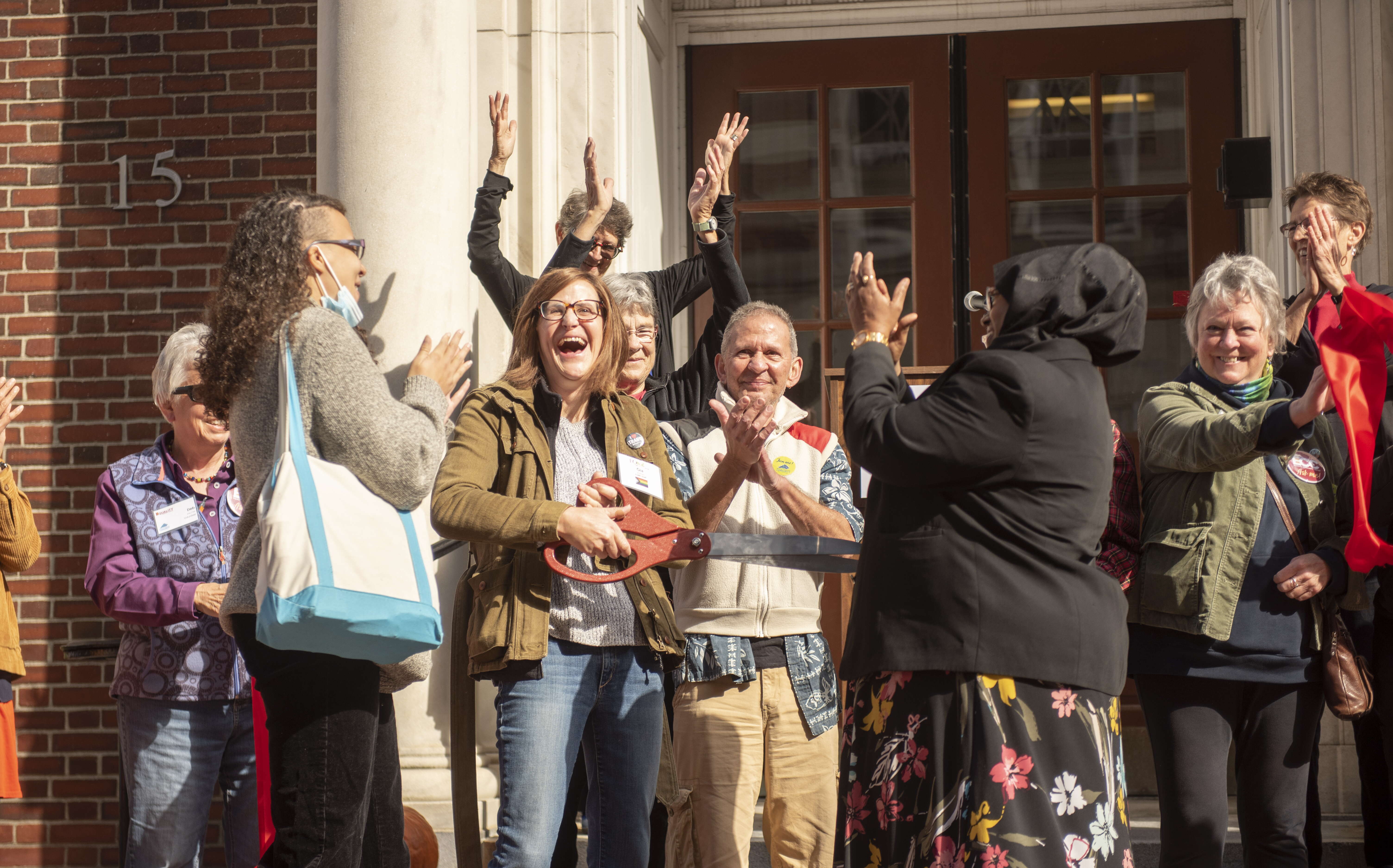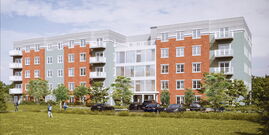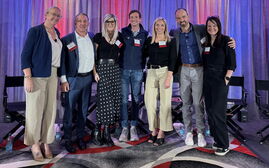
LGBTQ+ equality center to break ground on affordable housing complex in Portland
 Rendering / Courtesy, Equality Community Center
The Equality Community Center in Portland expects to break ground this fall on an affordable senior housing complex for people age 55 and over, with support services for LGBTQ+ older adults.
Rendering / Courtesy, Equality Community Center
The Equality Community Center in Portland expects to break ground this fall on an affordable senior housing complex for people age 55 and over, with support services for LGBTQ+ older adults.
The Equality Community Center in Portland expects to break ground this fall on Maine's first affordable senior housing complex offering support services for LGBTQ+ older adults.
The 54-unit building will be open to anyone age 55 and over, including people who are LGBTQ+, allies and other marginalized members of the community.
“It’s always been, ‘Someday we’re going to do it,’” said Christopher O'Connor, the Equality Community Center’s executive director. “Now we have the drawings, we have a plan, we have the funding, and people are so excited.”
The housing complex is next door to the center’s collaborative workplace, which opened in 2022 at 15 Casco St. as space for LGBTQ+ and social justice-seeking nonprofit organizations.
Community hub
The idea for the Equality Community Center was sparked in 2014, when a group of community members set out to explore how to fund the creation of an LGBTQ+ community hub in Maine. They developed a financial plan and formed a board of directors in 2015.
That December, they opened the Equality Community Center in downtown Portland at 511 Congress St., where ECC and allied LGBTQ+ organizations have since hosted hundreds of events and thousands of community members, families and allies.

In 2021, with the help of an angel donor, ECC bought 15 Casco St., began major renovations of the building and launched a capital campaign to raise $4 million. The campaign has raised most of that amount, allowing ECC to complete the development of 15 Casco St. and move there in 2022.
Today, the Equality Community Center offers a long list of support groups, assistance programs and community gatherings, The center also provide office space to many organizations that seek to do the same, including EqualityMaine, MaineTransNet, Pride Portland!, Cross Cultural Community Services, Democracy Maine, Sexual Assault Response Services of Southern Maine, and Through These Doors.
A great room on the first floor is frequently filled for events, lectures and performances, and the adjoining Safe Combinations Thrift Store is open four days a week. There are several conference rooms, a reading room and a café.
“The center provides social and educational programming for all while supporting the most marginalized in our communities,” said O’Connor.
“We believe that achieving equality and equity requires visibility and access, and we aim to serve as the first ‘point of contact’ for people in need, but also as an incubator for ideas and creativity to ensure that everyone who seeks inclusivity knows there is a warm and open-hearted gathering place waiting for them.”

Contributions and support for the center’s development came from many community organizations and businesses, including Norway Savings Bank. Last month, the bank delivered a $50,000 check as part of a four-year commitment to the center.
“It’s a space where everyone can feel safe, heard and valued,” said Dan Walsh, the bank’s president and CEO.
Affordable housing
The Equality Community Center next began planning to develop a vacant parking lot next door, at 25 Casco St. The lot was donated by Ed Gardner, one of the center’s founding members, a current board member, chair of the center’s housing committee and owner of Gardner Real Estate Group.
The initial idea was to build a mixed-use building with retail, community space and residences. But after researching the community’s greatest needs, the plan changed to focus solely on affordable senior housing.
Affordable, centralized housing has been a longstanding need for LGBTQ+ seniors in Maine, said O’Connor. The location in the heart of downtown Portland is expected to offer access to social services, health care, transportation, entertainment and recreation, as well as proximity to the ECC next door.
The 54 units will be comprised of 12 efficiency units from 501 to 525 square feet, 34 one-bedroom units from 567 to 715 square feet and eight two-bedroom units from 798 to 837 square feet.
Nineteen of the units will be accessible — seven are required by law and the organization has pledge an additional 12 units.
At least 60% of the units will be rented to households earning 50% or less of the area median income. The remaining units will be rented to households earning 60% or less of AMI.
MaineHousing will provide vouchers for 11 units that will be pledged to serve people with disabilities and/or those living with HIV/AIDS. ECC will partner with the Frannie Peabody Center and Independence Association to fill those units.
The Frannie Peabody Center is a Portland nonprofit offering services for people affected by HIV/AIDS. The Independence Association is a Brunswick nonprofit that supports adults and children with disabilities.
Amenities will include a retail cafe/coffee shop with outdoor patio, a community room, bike room and laundry room. The Arts District Parking Garage is located adjacent to the building.
Tax credits
Kevin Bunker is the developer and Laura Reading is the project lead. Both are with Developers Collaborative in Portland. Ryan Senatore Architecture in Portland is the architect. Penobscot General Contractors in Falmouth was contracted for construction through a competitive bid process.
Financing will be provided through MaineHousing’s affordable housing tax credits, federal Low Income Housing Tax Credits, a commercial bank loan and a 75% tax increment finance district awarded by the city of Portland. A lender has not yet been identified.
The federal Low Income Housing Tax Credit is a program of the U.S. Department of Housing and Urban Development. The program provides a subsidy in the form of a federal tax credit to developers of affordable rental housing. Developers sell the tax credit to corporate investors and that money is used as equity in the rental housing project. Developers must reserve a portion of the rental units for lower-income renters.
The approximate budget is $15 million but is still being finalized.
“It’s all about piecing together how a small nonprofit like us can build a 54-unit housing project,” O’Connor said.
Construction could take 14 to 16 months. Portland Housing Authority will serve as the building management company. The Equality Community Center will be the owner of the building.
National trend
The project joins a growing national trend in which senior affordable housing communities are being built in conjunction with LGBTQ+ community centers in cities across the country, including Fort Lauderdale, Los Angeles, San Diego, Chicago and Philadelphia, according to ECC.
The Equality Community Center is in the process of raising $250,000 — the final piece of its original $4 million capital campaign — to ensure its has contingency funds before breaking ground.
The need for the housing project, said O’Connor, is most apparent as members of the LGBTQ+ community age.
“When we talk about marginalized folks in the LGBTQ+ community, our elders are one of the groups that are at the top of the list,” he said.
Many folks in the community don’t have children to step in as the caretakers that many others rely on as they age, he said.
Some can’t keep pace with the rise in the cost of living. They might become isolated.
“So for us, the ability to provide a safe and welcoming place, where people can stay connected to the community, where they have great transportation to health care, to recreational centers and, most importantly, to people — we’re really thrilled to be able to offer this to the community,” O’Connor said. “The response has been overwhelmingly positive.”













0 Comments